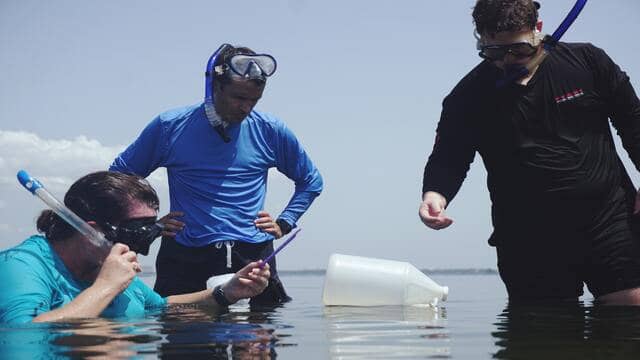There are countless career opportunities in Science, Technology, Engineering, and Math (which is what STEM stands for) fields. A vast catalog of interdisciplinary degree and STEM Programs exist from robotics to animal sciences to civil engineering and beyond.
Choosing a STEM major or degree can pave the way to a variety of high-paying career prospects. Thanks to constant expansion in these industries, STEM jobs continue to grow and are in high demand.
However, there are important skills and qualities that are needed for any of the STEM programs. Some abilities that are common throughout STEM majors and careers include:
- Ability to communicate effectively
- Analytical thinking skills
- Willingness to collaborate across disciplines
- Innovative reasoning
- Problem-solving skills
- Ethical and social accountability
- Interest in complex topics

STEM Careers Discussed in this Guide
Benefits of Pursuing a STEM Career
Pursuing a career in STEM offers numerous advantages for individuals seeking professional growth and personal fulfillment. One of the primary benefits is the high demand for STEM professionals across various industries, providing a plethora of job opportunities for qualified candidates. This demand is driven by the rapid advancements in technology and the increasing need for skilled professionals to tackle complex problems in science, engineering, and mathematics.
Along with high demand, STEM careers often come with competitive salaries and promising job growth potential. Due to the specialized knowledge and skills required in these fields, employers are willing to pay a premium for top talent. Furthermore, the ever-evolving nature of STEM industries creates continuous opportunities for career advancement and diversification.
In addition to financial rewards, STEM careers offer unique opportunities for innovation and problem-solving. Professionals in these fields are at the forefront of scientific discovery and technological development, working on projects that have the potential to transform industries and improve lives. This challenging and dynamic work environment can lead to immense personal satisfaction, as well as a sense of pride in contributing to societal advancements.
STEM Career Categories
STEM careers encompass a wide range of fields, offering diverse opportunities for individuals with varying interests and skill sets. To better understand the scope of STEM, it is helpful to categorize these careers into four primary areas: Science, Technology, Engineering, and Mathematics.
In the realm of Science, professionals can explore life sciences, such as biology and environmental science, which focus on the study of living organisms and their interactions with the environment. Alternatively, the physical sciences, including chemistry and physics, delve into the fundamental principles governing matter and energy.
Technology careers cover a broad spectrum, with information technology roles, such as computer programming and cybersecurity, addressing the design, implementation, and protection of digital systems. Engineering technology positions, on the other hand, involve the application of engineering principles to develop and maintain electronics, automation systems, and other technical solutions.
Engineering itself is a diverse field, with various specializations such as civil engineering, which includes construction and transportation infrastructure; electrical engineering, focusing on power systems and telecommunications; mechanical engineering, encompassing automotive and aerospace design; and environmental engineering, which tackles water resources management and pollution control.
Lastly, Mathematics careers can be divided into pure mathematics, where professionals engage in research and academia, and applied mathematics, which involves practical applications, such as statistics and data analysis. Both areas provide valuable contributions to the advancement of STEM fields and the development of innovative solutions to complex problems.
Steps to Pursue a STEM Career
Embarking on a STEM career involves a series of crucial steps to ensure success in your chosen field. Begin by assessing your interests and strengths, determining which STEM fields align with your passions and abilities. This self-assessment will provide a solid foundation for selecting a suitable career path.
Next, conduct thorough research on the various STEM careers and their respective requirements. Consider factors such as job growth, salary, and work environment to help you make an informed decision. Once you have identified a specific career path, focus on obtaining the necessary education and qualifications. This may involve pursuing relevant degrees, certifications, and training programs, as well as gaining practical experience through internships, co-ops, and part-time jobs.
Building a strong professional network is another essential aspect of pursuing a STEM career. Attend industry conferences, job fairs, and networking events to connect with professionals in your chosen field. Joining professional organizations and online communities can also provide valuable insights and resources, as well as opportunities to collaborate and learn from others.
Finally, prepare for and conduct a successful job search by tailoring your resume and cover letter to each position. Develop strong interview skills and showcase your accomplishments to impress potential employers and secure the STEM career you have worked so hard to achieve.
Tips for Success in a STEM Career
As you embark on your STEM career journey, it is important to adopt strategies that will contribute to your long-term success. One crucial aspect is staying current with industry trends and advancements by reading relevant publications, attending conferences, and participating in online forums. This continuous learning will keep you well-informed and better equipped to adapt to the ever-changing landscape of STEM fields.
Another key to success is continuously developing and improving your skills. Pursue professional development opportunities and certifications to enhance your expertise, and actively seek feedback from peers and mentors to learn from mistakes and refine your techniques. Cultivating a growth mindset by embracing challenges and viewing setbacks as opportunities for improvement will help you remain resilient and motivated throughout your career.
Finally, strong communication and teamwork skills are essential in STEM careers, as collaboration is often vital to solving complex problems and driving innovation. Strive to collaborate effectively with colleagues, contributing to a positive work environment and fostering relationships that will support your professional growth and success.
STEM Programs and Career Information
Here we will explore various STEM programs, career opportunities, and the skills needed to succeed in each of these areas. Within each of the STEM areas that we discuss below, there are numerous educational paths that will lead to a multitude of career opportunities. Many of these STEM careers even intersect in a multidisciplinary capacity. For example, choosing a robotics path can ultimately lead you to work in a geotechnical or food science field. Equine Science is a subfield of Animal Sciences. The options and opportunities within the STEM fields are truly endless.
Animal Science

Animal scientists study domestic pets, livestock, and exotic animals. Those who major in Animal Science will be able to research different areas, including genetics, nutrition, reproduction, and development. Beyond veterinary medicine and research, animal science majors can also study the business side of animal management. Some qualities and skills suited for animal science majors include:
- Love of and concern for animals
- Analytical thinking
- Good oral communication
- Time management skills
- Deductive reasoning
- Problem sensitivity
- Active listening
- Mathematical reasoning
Education and Internships
Most animal science careers require at least a master’s degree. However, some may require a Ph.D., M.D., or J.D. For those considering a career in animal science, schools offer programs such as Animal Science, Animal Biology, Animal Welfare and Animal Behavior. These programs may be housed under one of the following departments or a combination of them:
- Agriculture
- Environmental Sciences
- Biological Sciences
Animal Science programs are offered at the bachelors, masters and PhD degree levels. You may also find that some schools offer Animal Science as a minor rather than a full major degree program.
Internship opportunities often include time spent working at zoos, farms, or veterinary practices. Some colleges have on-site programs working directly in their animal care facilities. Hands-on experience is important for success in an animal science program.
Jobs
STEM degrees in animal science allow for a wide variety of career options. Here are some career pathways that may be available with a background in animal science:
- Pre-Veterinarian
- Animal Care Technician
- Laboratory Animal Caretaker
- Agricultural Worker
- Farm Management
- Zookeeper
- Wildlife Conservationist
- Researcher
Salary
The salary range depends on the level of training and field entered, but the average yearly salary for those in the animal science field is $60,300.
Geographical Locations
The highest need for animal scientists in the United States is found in Wisconsin, Minnesota, and Michigan. Depending on the specific discipline, for example, veterinary science, there are job markets in every state.
Areas of Research
Some areas you might research during your animal science studies include:
- Quality and safety of animal foods
- Avian management
- Food production
- Egg composition
- Health of beef cattle
- Animal production systems
- Nutrition of meat goats
- Reproduction of sheep
- Muscle biology
Robotics

A robotics major is responsible for designing and teaching robots how to work effectively. Robotics is one of the most complex STEM degrees available today. It combines mechanical and electronic engineering, computer science, design, and even areas of psychology.
Some qualities and skills you should have that will make you more suited to pursue a major in robotics include:
- Problem-solving skills
- Mathematical reasoning
- Idea fluency
- Perceptual speed
- Flexibility
- Deductive/Inductive reasoning
Education and Internships
Robotics engineers need at least a bachelor’s degree to enter most robotics-focused careers. Robotics technicians need at least a vocational certificate or an associate’s degree. If you want to become a robotics teacher, you’ll need both a background in robotics as well as some formal teacher training and certification.
Internships and hands-on experience are essential to success in the robotics field. Some robotics degrees require internships that are ideal for future success such as:
- Robotics Software
- Mechatronics
- AI & Machine Learning
Jobs
Robotics majors have a multitude of choices of careers in this field. Here are some jobs that may be available once you’ve completed your degree:
- Automation Engineer
- Research Engineer
- Design Engineer
- Factory Automation Engineer
- Autonomous Vehicle Design Engineer
- Robotic Systems Engineer
- Automation Technician
- Electrical and Instrumentation Technician
- Instrument and Automation Technician
Salary
Those in the robotics field may have an average yearly salary of $99,040. Your salary will depend on your background, experience, location and title.
Geographical Locations
Studies show that California, Washington, and Connecticut have the highest-rated markets for robotics jobs in the U.S., but overall as a career, there are jobs available everywhere.
Areas of Research
Some important areas of research involved in a robotics degree include:
- Artificial Intelligence
- Biomechanics
- Development of human robot interfaces
- Locomotion
- Programming
- Robot safety
- Robot installation and maintenance
- Kinematic coupling
Civil Engineering

A STEM degree in civil engineering will teach you how to combine all levels of mathematics with physical sciences to solve real-world problems facing a variety of industries. From planning to executing infrastructure in the public sector, studying civil engineering will be essential to the success of the business world.
Important attributes for civil engineer majors include:
- Mathematical reasoning
- Critical thinking
- Information ordering
- Problem-solving skills
- Decision-making
- Perceptual speed
Education and Internships
Most civil engineering jobs require at least a bachelor’s degree. Engineers also must follow individual state guidelines to become Professional Engineers (PEs).
An internship in civil engineering, while not necessarily required for all STEM degrees, will help you build your resume and can sometimes be paid.
Jobs
Those who have completed a civil engineering degree have a path to many careers such as:
- Civil Engineer
- Design Engineer
- Project Engineer
- City Engineer
- County Engineer
- Railroad Design Consultant
- Structural Engineer
Salary
The average yearly salary for civil engineers is $87,060.
Geographical Locations
California, Florida, Texas, New York, and Pennsylvania are considered the top five locations for civil engineer jobs.
Areas of Research
Some areas of research essential for Civil Engineers include:
- Water Quality Monitoring
- Heavy Metal Removal from Wastewater
- Building and Construction
- Traffic Engineering
- Soil Behavior and Dynamics
- Bridge Engineering
- Rainfall Modeling
Food Science

Food science is a multidisciplinary program within the STEM field. It combines microbiology, engineering, chemistry, and research to understand the properties of food and nutrition in new and innovative ways. Food scientists use their degrees to help solve real-world problems facing the food industry.
Some skills and abilities necessary for food science majors include:
- Problem sensitivity
- Information ordering
- Mathematical comprehension
- Reasoning skills
- Number facility
- Written and oral comprehension
Education and Internships
Most careers in the food science industry require at least a four-year bachelor’s degree. Some common internships available to food science majors are research, quality assurance, and manufacturing internships.
Jobs
Some careers in the food science field include:
- Food Scientist
- Product Development Scientist
- Food Chemist
- Product Development Scientist
- Food Technologist
- Food Engineer
- Drug and Food Research Scientist
- Formulator
- Product Development Scientist
- Research Chef
Salary
The average salary for those with in this field is $68,970 annually.
Geographical Locations
California, New Jersey, Texas, Georgia, and Wisconsin have the highest need for food scientists, according to the U.S. Bureau of Labor Statistics.
Areas of Research
Some essential areas of research for Food Science professionals include:
- Food Safety
- Measurement and Evaluation of Food Products
- How food impacts and contributes to enhanced health
- Chemical processes involved in all food components
- Consumer perception of food safety, processed food and ingredients
- The causes of food spoilage
Environmental Science

Environmental Scientists collect data, research and analyze samples, develop plans to fix issues facing the environment, and provide detailed reports and presentations to discuss their findings and proposed solutions.
Skills and abilities helpful for those choosing an environmental science degree include:
- Reasoning skills
- Information ordering
- Mathematical reasoning
- Problem sensitivity
- Oral and written comprehension
- Perceptual speed
Education and Internships
Environmental Scientists typically need at least a bachelor’s degree to obtain entry-level STEM careers. A master’s degree may be required to advance in the field.
It is suggested that environmental science majors look for internships that focus on computer modeling, data analysis and geographic information systems (GISs)
Jobs
Environmental science programs can lead to a vast number of careers. Some job options include:
- Climate Change Analyst
- Environmental Technician
- Public Health Sanitarian
- Water Quality Analyst
- Health and Safety Specialist
- Environmental Protection Specialist
- Engineering Professor
- Environmental Sciences Professor
- Industrial Ecologist
Salary
The average salary for environmental scientists and specialists is $71,360.
Geographical Locations
Some states that are suited for environmental science jobs are California, Texas, and Florida
Areas of Research
Some areas of research that environment science professionals will focus on include:
- Climate Change: how to predict and adapt to climate change
- How human evolution has changed the Earth’s ecology and landscapes
- Marine Science
- The development of sustainable materials for manufacturing
- Oceanography
- How organisms have adapted over time
Geotechnical Engineering

Geotechnical engineering teaches students to study beneath the earth’s surface in order to determine safety measures and factors for civil engineering projects such as roads, tunnels, and construction sites. STEM Programs in geotechnical engineering are a specialization of the civil engineering department.
Some abilities and skills that are essential for geotechnical engineering majors are:
- Problem-solving skills
- Mathematical reasoning
- Critical thinking
- Decision-making
- Perceptual speed
- Information ordering
Education and Internships
Most careers in the geotechnical engineering field require a master’s degree. Engineers also must follow individual state guidelines to become Professional Engineers (PEs).
Internships in geotechnical engineering are helpful to gain practical experience in this advanced field. They can also be a good path to full-time careers.
Jobs
Some geotechnical engineering careers are:
- Geotechnical Construction Engineer
- Structural Engineer
- Geotechnical Project Manager
Salary
Geotechnical Engineers can expect to make an average yearly salary of $65,000.
Geographical Locations
California, Texas, and Florida are the top three states for careers in geotechnical engineering.
Areas of Research
Some areas of study in the Geotechnical Engineering field include:
- Geotechnical Analysis
- Mathematics
- Civil Engineering
- Project Management
- Autocad
- Government and Law
Urban Forestry

Programs in urban forestry teach students about forest environments that are in close relation to urban areas. Urban Forestry principles studied include tree and forest care, pollution, and urban environments.
Some skills and abilities that are essential for urban forestry majors include:
- Reasoning skills
- Problem sensitivity
- Oral and written communication skills
- Flexibility
- Control precision
Education and Internships
A Bachelor’s degree is required for a career in urban forestry. A doctoral degree will be required for postsecondary teacher positions.
Internships for urban forestry majors are often offered through local, state, or federal government programs.
Jobs
A degree in urban forestry can lead to careers such as:
- Area Forester
- Environmental Protection Forester
- Fire Prevention Forester
- Forest Practices Field Coordinator
- Resource Forester
- Urban Forester
- Forestry and Conservation Science Teachers (postsecondary)
Salary
The average annual salary for those with urban forestry degree or background is $61,790.
Geographical Locations
Texas, Washington, D.C., and Minnesota are three areas with high percentages of urban forests that may be excellent places to search for careers.
Areas of Research
Some areas of research within urban forestry programs include:
- Tree Mortality
- Air Quality
- Forest Management
- Wildlife
- Fire Science
- Resource Restoration
- Aquatic and Fish Ecology
Equine Science

Equine Science programs prepare students for specialized Animal Studies careers by providing an educational foundation in both the biological processes and the business aspects of the growing horse industry.
Skills and abilities that make can make you a good fit for an equine science program include:
- Critical thinking skills
- Flexibility
- Complex problem-solving
- Social perceptiveness
- Decision-making
- Reasoning skills
Education and Internships
There are associate and bachelor’s programs available in equine studies. Master’s and doctoral degrees are also available for those choosing a teaching path in this area.
Internships are often required for equine science majors because this firsthand experience and training is the best way to truly learn to care for and understand horses.
Jobs
Some advanced careers that are suitable for those with an equine science degree are:
- Horse Veterinarian
- Horse Feed Development Specialist
- Pedigree Analyst
- Geneticist
- Nutritional Consultant
- Veterinary Technician/Assistant
- Instructor
Salary
The average yearly salary for equine science STEM Majors is $57,821.
Geographical Locations
Wisconsin, Texas, and Minnesota are the ranked as having high levels of job openings for Animal Scientists, including those in equine science.
Areas of Research
- Equine Physiology
- Genetic Disorders in Horses
- Equine Reproduction
- Equine Nutrition
Is a STEM Program Right For You?
Researching specific programs in the STEM fields is the first step toward a rewarding and successful future and career. For those considering a STEM career in any field, there are certain traits that will be necessary for success. Naturally curious, analytical, and forward-thinking individuals are often well-suited for science, technology, engineering, and math careers. If you already know the field you want to specialize in, the list we laid out for you is a great start. If you’re unsure of the type of career you want, consider majoring in a general STEM subject such as biology, chemistry or physics. You could also have a great career with a degree in biology, physics or any of the general STEM subjects. If you figure out later you want more specialization, you could always matriculate later in your college career.
Whether you have a passion for solving complex problems in the business world, finding innovative and creative solutions for real-world issues, working with animals and nature, or have an interest in high-tech industries, there are countless opportunities and STEM Programs for you to choose from. Choosing a career in STEM is a path to a successful, lucrative, and important career for your future. Begin your search by first learning what to look for in an online degree program.
Suggested Reading: Highest Paying STEM Degrees
